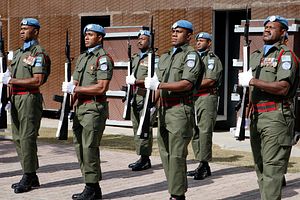On the margins of the current 73rd Session of the United Nations General Assembly there have been a number of events focused on specific orientations of the organization. These events provide an opportunity for states to reflect on the unique approaches and contributions that they make to UN operations, and set out their perspectives and plans for their engagement with the UN’s various arms. This is particularly important for smaller states that may not have the power to ascend to the Security Council, or the resources to contribute to major relief efforts, but are able to find niches within the UN to provide valuable contributions.
For Fiji, UN Peacekeeping Operations have offered a significant opportunity to demonstrate its commitment to the ideals of international cooperation. Despite its small size (its population is around 900,000), Fiji has played an important role in the UN’s Peacekeeping Operations for the past four decades. Since the 1970s Fijian peacekeepers have served in in almost every major conflict zone, including Angola, Bosnia and Herzegovina, Cambodia, Croatia, Darfur, Iraq, Kosovo, Lebanon, Liberia, Sinai, Namibia, the Solomon Islands, Kosovo, Rwanda, Somalia, South Sudan, and Timor-Leste. Per capita since 1970, Fiji has contributed more personnel to UN Peacekeeping missions than any other state. Around half of Fiji’s military is either deployed overseas or training to replace those deployed overseas.
This week at the High-Level Meeting on Action for Peacekeeping, Fijian Prime Minister Frank Bainimarama gave a speech outlining the reasoning for his country’s commitment to UN Peacekeeping. “At home in Fiji we are blessed to enjoy a measure of peace, security, and prosperity that many millions of global citizens cannot,” Bainimarama said. “That is why so many Fijians have been willing to enter the ranks of global peacekeepers. Because we believe that the right of peace should be enjoyed by all of humanity. That is why we’ve given 40 years of service, and sacrifice, to this cause. And that is why we stand ready, as ever, to do our part in this critical global effort. “
Bainimarama went on to explain that Fiji’s commitment to to UN Peacekeeping Operations had become integral to the country’s national sentiment, stating, “Our pride and appreciation for our peacekeepers is very much a part of how every Fijian sees our nation in the world.” He connected this national sentiment to the wider universal values that Fiji seeks to promote globally: “[W]hile we may be a small country, we’ve shown ourselves more than willing to do our part to protect the innocent, shield the vulnerable and uphold the basic human rights of all people.”
These are admirable sentiments that should be taken in good faith, and should be divorced from any cynicism around developing and smaller states using UN organizations as sources of national income. Yet there remain some unintended consequences of Fiji’s major participation in UN Peacekeeping Operations. While other governments of developing countries have seen peacekeeping operations as a way to enhance their military budgets, and not passed UN reimbursements respectfully on to their soldiers, Fiji does compensate their soldiers well. The UN pays governments that contribute troops to peacekeeping missions at a rate of $1,428 per soldier per month (as of July this year), and individual Fijian soldiers receive most of this sum. This makes joining the military a financially rewarding endeavor for many Fijians, and creates a certain degree of social pressure on the government to provide greater opportunities within the military for its citizens. The experience gained in peacekeeping operations also makes Fijians prime candidates for well-paid private security positions in places like Iraq.
These factors appear to have facilitated the growth of a much larger military than a geographically isolated country with no animosities requires, which could then be seen as fueling the army’s outsized role in Fiji’s domestic affairs, including the country’s three military coups (a fourth coup was civilian-led). Bainimarama himself was responsible for two of these military coups, and the current leader of the opposition in the Fijian parliament, Sitiveni Rabuka, was responsible for the first in 1987. Fiji’s president, Jioji Konrote, commanded Fijian troops in their first peacekeeping mission, in Lebanon in 1978. This is an indication of how central the military has become in Fijian society, and how figures with prominent military backgrounds have become entrenched as powerful actors within the country’s political institutions.
Bainimarama used his speech to reiterate Fiji’s continued involvement in UN Peacekeeping Operations. This remains a consensus approach within Fijian politics, with Rabuka also recently affirming his party’s commitment to peacekeeping operations should they form a government in forthcoming elections (to be held by the end of November). This suggests that the incentives within Fiji to maintain its large military apparatus remain strong, and the sizable influence this will have on the country’s affairs will persist.
While there may be a nobility to Fiji’s desire to participate in global peacekeeping operations, the knock-on effects of its political institutions becoming too heavily stacked with former military operatives remains far from ideal after the country’s restoration of democracy in 2014.

































